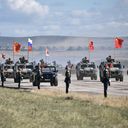U.S. pressure drives Russia, China and Iran closer together

America's biggest adversaries — China, Russia and Iran — are increasingly teaming up in ways that could undermine U.S. objectives.
Driving the news: Russian and Chinese forces began major military exercises Thursday in Russia's far east. Meanwhile, Russia has received an initial batch of drones from Iran to deploy on the battlefield in Ukraine.
- Those are just the latest examples of America's top geopolitical foes finding common cause.
- Referring to relations with countries like Iran and Russia, a Chinese diplomat tells Axios it's "only natural" that countries facing sanctions and pressure from the U.S. would move closer together.
The big picture: The relationships among these three countries are defined not by deep bonds or shared values, but by specific interests and the mutual desire to challenge Washington.
Where it stands: While Beijing is officially neutral on Russia's invasion, officials and state media have repeatedly blamed it on the U.S. and NATO and refused to criticize the Kremlin.
- Moscow, in turn, publicly backed Beijing's muscular response to House Speaker Nancy Pelosi's visit to Taiwan.
- The two powers have also joined forces on a series of recent votes at the UN Security Council, including to veto U.S.-backed sanctions on North Korea.
Zoom in: Moscow's decision to proceed with the Vostok war games with China this week is intended as a signal that Russia can still "play on multiple chess boards" even with so many of its forces now in Ukraine, said Alexander Gabuev, an expert on Russia-China relations at the Carnegie Endowment.
- The exercises are likely to be scaled back from the 2018 iteration due to the war, and several other countries including India will also take part. But China is expected to have the largest footprint aside from Russia for both the ground and naval exercises.
- "China is sending a signal that despite the war and Western pressure on China, the military component of China-Russia relationship is getting stronger," Gabuev said.
That's also true in terms of trade between the countries, which has increased in value by around 30% this year — helping to ease the blow of Western sanctions
- Those sanctions will make Russia even more reliant on China as a customer for its energy and as a source of goods, particularly high-tech products.
- A lot of that trade is circumventing the U.S. dollar, Gabuev noted.
Between the lines: While Vladimir Putin and Xi Jinping take every opportunity to emphasize that the relationship has "no limits," it's growing more imbalanced due to China's rise.
- Still, Moscow is a valuable source of discounted oil and gas and weapons technology for Beijing, and of irritation for Washington.
- "Just think about the amount of hours that were stolen from [CIA Director] Bill Burns, [national security adviser] Jake Sullivan and the president himself that they wanted to spend on China that they have to spend dealing with... Russia," Gabuev said.
- Yes, but: The war could also strain China-Russia ties as it drags on, as Ali Wyne of Eurasia Group has noted. And China appears not to have crossed the U.S. red line over providing arms to support Russia's war effort.
Iran has definitely crossed that line. National Security Council spokesperson John Kirby said Wednesday that a first shipment of Iranian drones had been "newly introduced to the fight" in Ukraine.
- Iran and Russia have also reportedly been collaborating to evade Western sanctions, a partnership that could undermine U.S. efforts both to impose costs for the Ukraine invasion and to convince Iran to return to compliance with the 2015 nuclear deal.
- While Russia and Iran had cooperated in various areas in the past, they also had disagreements, a Western official said. Now, the relationship is "assuming a more strategic character" because "Russia needs Iran more than before."
China's increased purchases of Iranian oil, meanwhile, are helping to keep the Iranian economy afloat — and undercutting U.S. leverage over Tehran.
- The two countries announced in January that they were entering the implementation stage of a 25-year economic and security cooperation agreement.
The bottom line: "A marriage of convenience can be much more durable than a romantic relationship," Gabuev said.